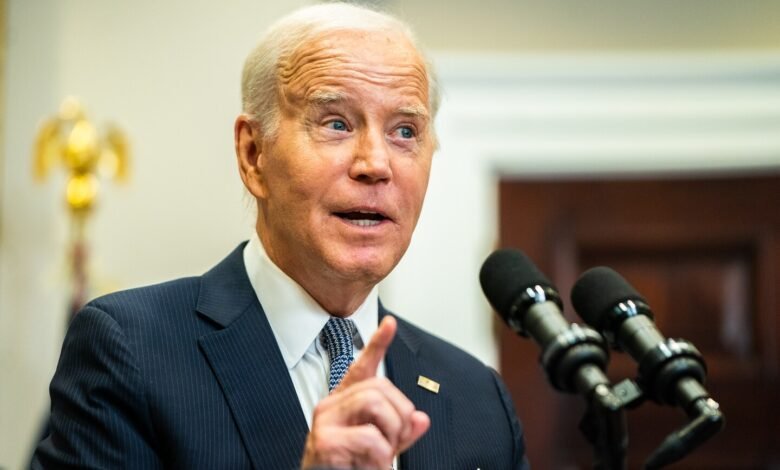Biden endorses Supreme Court reforms, amendment to limit immunity

For Biden, who has long resisted calls to reform the Supreme Court, Monday’s announcement marked a major shift in his stance toward one of the three branches of government. Since Biden took office, the Supreme Court has shifted sharply to the right — overturning Roe v. Wade, end affirmative action in college admissions, weaken the power of federal agencies by overturning a 40-year-old ruling, and overturn Biden’s student loan forgiveness program.
“I have overseen more Supreme Court nominations as a senator, vice president and president than anyone alive today,” Biden wrote in an op-ed in The Washington Post published Monday morning. “I have great respect for our institutions and the separation of powers. What is happening now is not normal and undermines public confidence in the court’s decisions, including those that impact personal liberties. We are now in a breach.”
The President will officially announce his support for changes during a speech commemorating the 60th anniversary of the Civil Rights Act at the LBJ Presidential Library in Austin. The Post previously reported that Biden was set to call for all three changes.
The calls, however, are largely aspirational at this stage, given the long odds they face in implementation. Term limits and an ethics code are subject to congressional approval, and the Republican-controlled House is unlikely to support either. Both proposals also require 60 votes to pass in the Senate, and Democrats hold just 51 seats in the upper chamber. Passing a constitutional amendment requires overcoming even more hurdles, including support from two-thirds of both chambers, or through a convention of two-thirds of the states, and then approval by three-quarters of the state legislatures.
Biden’s proposed amendment, which Biden is calling the “No One Is Above the Law Amendment,” states that the “Constitution does not confer any immunity from federal criminal indictment, trial, conviction, or sentence by virtue of having previously served as President.”
In his op-ed explaining his decision, Biden wrote: “This nation was founded on a simple but profound principle: No one is above the law. Not the president of the United States. Not a justice of the Supreme Court of the United States. No one.”
The Supreme Court’s immunity ruling, which was based on ideological lines, made it extremely unlikely that Trump would go to trial on charges of trying to subvert the 2020 election before voters cast ballots in this year’s presidential contest.
Less than an hour after that ruling, Biden called Laurence Tribe, a constitutional law professor at Harvard Law School, to discuss the decision and the arguments for and against revamping the court. The following week, Biden called Tribe again, and the two discussed a Guardian op-ed he wrote endorsing Supreme Court reforms. Among the options they discussed: term limits, an enforceable ethics code and a constitutional amendment to address presidential immunity.
Tribe confirmed it spoke to Biden but declined to comment on the discussion.
Biden’s call for an enforceable ethics code follows a year of scandals at the Supreme Court, largely centered on Justice Clarence Thomas and his failure to disclose gifts. Justice Samuel Alito has also come under fire for flying politically provocative flags at his homes.
Biden wrote that ethics codes should require judges to “disclose gifts, refrain from public political activity, and recuse themselves from cases in which they or their spouses have financial or other conflicts of interest.”
Term limits, Biden said, would allow future presidents to appoint a justice every two years and would make Supreme Court appointments “more predictable and less arbitrary.” He noted that the United States is the only major constitutional democracy that gives lifetime appointments to its Supreme Court justices.
After The Post first reported on Biden’s proposals, former President Donald Trump, the Republican presidential nominee, criticized the president’s plan.
“Democrats are trying to interfere in the presidential election and destroy our justice system by attacking their political opponent, ME, and our Honorable Supreme Court,” he wrote on Truth Social. “We have to fight for our fair and independent courts and protect our country.”
During the 2020 presidential race, Biden rejected calls from liberals to expand the court, but promised to create a commission to study possible changes. He followed through on that. vote after being elected, and the commission issued a 294-page report to the president. Before Monday, Biden had not acted on the commission’s report since it was approved in December 2021.
Biden had been planning to endorse changes to the Supreme Court even before he announced last weekend that he was changing course and not seeking a second term as president. Biden hinted at his plans during a call with the Congressional Progressive Caucus, a call that was part of his unsuccessful effort to keep Democrats united behind his candidacy.
“I’m going to need your help on the Supreme Court, because I’m about to make a statement — I don’t want to announce it prematurely — but I’m about to introduce a major initiative to limit the court. … I’ve been working with constitutional scholars for the last three months, and I need your help,” Biden said, according to a transcript of the call obtained by The Post.




